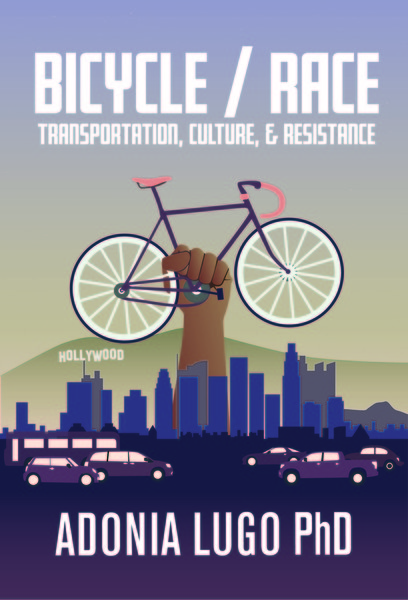At this year's meeting of the American Anthropological Association, I was thrilled to present my research alongside a few other people studying the politics of mobility. (That last phrase isn't just jargony gibberish, but instead a way to talk about the fact that not everyone encounters urban space and transportation in the same way. Race, class, and ability impact our mobilities and how we conceptualize them.)
First up on the panel was Scott Brown, a graduate student in anthropology at the New School for Social Research in NYC. His talk, "Shifting Gears: Cycling Toward an Anthropology of Design," dealt with bike infrastructure design, and was based on his work with Parsons' UrbanBike program.
Then Lusi Morhayim, an architect working on a PhD at UC Berkeley, gave a talk on "Car-Free Street Events: From Counter-Public Opinions to Counter-Spaces." She has done participant-observation at Critical Mass, Sunday Streets, and Park(ing) Day in San Francisco, and had an eloquent take on how these events affect participants' ideas about public space.
From the University of Memphis came a paper entitled "'It Will be a Super-Highway for Drugs and Crime!': Neighborhood Perceptions of Greenlines, 'Urban Danger,' and Transportation Alternatives in Memphis, TN." I learned that the University of Memphis has a strong applied anthropology program where people can get MAs while carrying out community-based projects. In this case, Dr. Keri Brondo led a research team that partnered with Matt Farr, who works for the Shelby Farms Park Conservancy, to bolster public support for the Shelby Farms Greenline, which converted an old rail right of way into a multi-use path.
Matt read the paper, and has also started a website, Bikes Mean Business, that promotes biking by showing its benefits for local economies. Their paper argued that bicycling has a lot of potential to improve health in Memphis, but people see it as a vehicle for crime. This rang true for me; my experience listening to homeowners in Long Beach reject a bike lane while using euphemistic language about people of color and the poor was what first got me thinking about bikes and anthropology back in 2008, so I was glad to hear the Memphis group's research on this topic.
Next I presented my paper, "Diverse City: Situationism, Anthropology, and DIY Bike Infrastructure in Los Angeles."
My talk focused on the tendency among bike folks to think about infrastructure in terms of concrete, physical changes to built environments instead of thinking about experimental, human infrastructures. Drawing on the legacy of situationist "happenings," I framed ciclovías as an example of how you can create a temporary zone where biking is less harrowing, and how this could impact what people feel is possible the next day when the streets are full of traffic again. During the talk I showed a continuous playlist of videos people had posted to Youtube of their day at 10-10-10, the first CicLAvia.
After me came Nathalie Boucher, a PhD student at Montréal's Institut national de la recherche scientifique - Centre Urbanisation Culture Société. She read "Going Down to the Place of Three Shadows: Journeys to and from Downtown Los Angeles Public Spaces," a paper about her ethnographic research in different parks in downtown LA, and her experience spending the day with a wheelchair-bound homeless man.
Our discussant was Zack Furness, a cultural studies professor, author of One Less Car: Bicycling and the Politics of Automobility, and someone with a damn cool website. Since Zack couldn't make it to the conference, he sent us written comments on our papers, and I read them at the end.
Maybe one day I'll be surrounded by others who research bikes, but at this point in time it's pretty freaking novel for me to spend time with people who are reading the same theories as me and are experiencing the same bikey moments as me. My brain felt like this for the rest of the conference:

